constitution
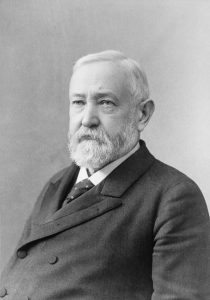 Sometimes, a business starts up and then can’t make a go of it. Whatever the reason, things just don’t work out. Such was the case with a 1690 newspaper called Publick Occurrences Both Forreign and Domestick. This newspaper was published for the first and last time on September 25, 1690, making it the shortest business on record.
Sometimes, a business starts up and then can’t make a go of it. Whatever the reason, things just don’t work out. Such was the case with a 1690 newspaper called Publick Occurrences Both Forreign and Domestick. This newspaper was published for the first and last time on September 25, 1690, making it the shortest business on record.
It would seem like such a business venture wouldn’t hold a very significant place in history, but it did have one distinction that gave it an important place. It was the first multi-page newspaper published in the Americas. Before then, single-page newspapers, called broadsides, were published in the English colonies and printed in Cambridge in 1689. The first edition of Publick Occurrences was published in Boston, then a city in the Dominion of New England, and was intended to be published monthly, “or, if any Glut of Occurrences happen, oftener.” It was printed by American Richard Pierce of Boston, and it was edited by Benjamin Harris, who had previously published a newspaper in London. The paper contained four 6 by 10 inch pages, but filled only three of them…not bad for a new newspaper.
The second edition was never printed because the paper was shut down by the Colonial government on September 29, 1690, who issued an order as follows: “Whereas some have lately presumed to Print and Disperse a Pamphlet, 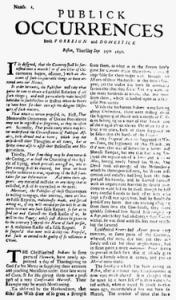 Entitled, Publick Occurrences, both Forreign and Domestick: Boston, Thursday, September 25th, 1690. Without the least Privity and Countenace of Authority. The Governour and Council having had the perusal of said Pamphlet, and finding that therein contained Reflections of a very high nature: As also sundry doubtful and uncertain Reports, do hereby manifest and declare their high Resentment and Disallowance of said Pamphlet, and Order that the same be Suppressed and called in; strickly forbidden any person or persons for the future to Set forth any thing in Print without License first obtained from those that are or shall be appointed by the Government to grant the same.”
Entitled, Publick Occurrences, both Forreign and Domestick: Boston, Thursday, September 25th, 1690. Without the least Privity and Countenace of Authority. The Governour and Council having had the perusal of said Pamphlet, and finding that therein contained Reflections of a very high nature: As also sundry doubtful and uncertain Reports, do hereby manifest and declare their high Resentment and Disallowance of said Pamphlet, and Order that the same be Suppressed and called in; strickly forbidden any person or persons for the future to Set forth any thing in Print without License first obtained from those that are or shall be appointed by the Government to grant the same.”
Of course, in those days, we were not an independent nation, and the Constitution did not exist. Freedom of the press…or any of the other freedoms that our soldiers and our nation have fought to give us, didn’t exist either. England was the ruler and the law, and we had to obey…for a time. Soon enough, change would come, as would freedom, and every kind of newspaper and other types of information sources imaginable.
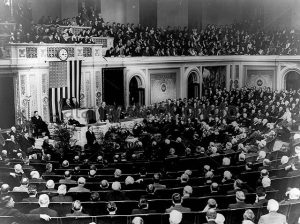
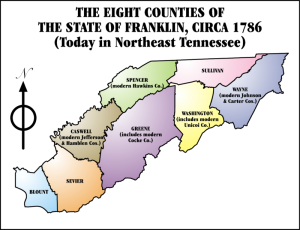 Have you heard of the nation of Frankland…or maybe the nation of Franklin? I hadn’t either, but it was a real place. Early in the history of the United States, its people operated on somewhat limited trust of the government…probably due to the treatment they received in England. In April of 1784, the state of North Carolina ceded its western land claims between the Allegheny Mountains and the Mississippi River to the United States Congress. The settlers who lived in that area, known as the Cumberland River Valley, had already formed their own government from 1772 to 1777, and their distrust of Congress led the to worry that the area might be sold to Spain or France to pay off war debts owed them by the government. Due to their concerns, North Carolina retracted its cession and started to organize an administration for the territory.
Have you heard of the nation of Frankland…or maybe the nation of Franklin? I hadn’t either, but it was a real place. Early in the history of the United States, its people operated on somewhat limited trust of the government…probably due to the treatment they received in England. In April of 1784, the state of North Carolina ceded its western land claims between the Allegheny Mountains and the Mississippi River to the United States Congress. The settlers who lived in that area, known as the Cumberland River Valley, had already formed their own government from 1772 to 1777, and their distrust of Congress led the to worry that the area might be sold to Spain or France to pay off war debts owed them by the government. Due to their concerns, North Carolina retracted its cession and started to organize an administration for the territory.
At the same time, representatives from Washington, Sullivan, Spencer (modern-day Hawkins) and Greene 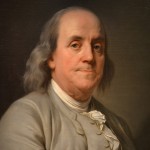 counties declared their independence from North Carolina. Then, in May, they petitioned the United States Congress for statehood as Frankland. The simple majority favored the petition, but Congress could not get the two thirds majority to pass it…not even when the people decided to change the name to Franklin, in the hope of winning favor with Benjamin Franklin and some of the others.
counties declared their independence from North Carolina. Then, in May, they petitioned the United States Congress for statehood as Frankland. The simple majority favored the petition, but Congress could not get the two thirds majority to pass it…not even when the people decided to change the name to Franklin, in the hope of winning favor with Benjamin Franklin and some of the others.
When the petition failed to pass, the people in the area grew angry, and decided to defy Congress. On this day, August 23, 1784, they ceded from the union and functioned as the Free Republic of Franklin (Frankland) for four years. During that time, they had their own constitution, Indian treaties and legislated system of barter in lieu of currency. Two years into the Free Republic of Franklin’s history, North Carolina set up their own parallel government in the area. The economy was weak, and never really gained ground, so the governor, John Sevier approached the Spanish for aid. That move brought a feeling of terror in the government of North Carolina, and they arrested Sevier. The situation worsened when the Cherokee, Chickamauga and Chickasaw began to attack settlements within Franklin’s borders in 1788. Franklin quickly rejoined North Carolina to gain its militia’s protection from attack.
It was a short life for the little nation of Franklin, and eventually they wouldn’t even belong to North Carolina, but rather became a part of the state of Tennessee. It just goes to show that the growing pains of a nation can  take on many forms to reach their destiny as a whole nation. Some changes are good ones, and continue on into the future, and others are not so good, and are sometimes absorbed into the fabric of history and time, and end up looking nothing like the change they started out to be.
take on many forms to reach their destiny as a whole nation. Some changes are good ones, and continue on into the future, and others are not so good, and are sometimes absorbed into the fabric of history and time, and end up looking nothing like the change they started out to be.
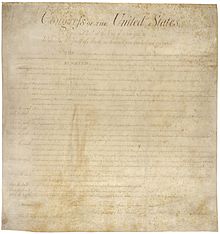 A few days ago, I wrote about the United States Constitution, and how it was ratified by Massachusetts, with the condition that it be amended to include some rights that they felt were very important. On this day, September 25, 1789, those amendments were created. The first ten became the Bill Of Rights. These amendments would not be ratified until December 15, 1791. These days, there is some confusion and some complete ignorance as to the meaning of some of these rights…especially the first amendment. I can’t count the number of times that I have heard that according to the constitution, we are to have separation of church and state. That could not be further from the truth, and in fact would be an impossibility. The very idea that a person who holds political office could separate his or her religious values from their voting on matters concerning laws of the land is insane, and it is not what our forefathers meant when the Bill of Rights was created. The first amendment reads, “Congress shall make no law respecting an establishment of religion, or prohibiting the free exercise thereof; or abridging the freedom of speech, or of the press; or the right of the people peaceably to assemble, and to petition the Government for a redress of grievances.” All the first amendment…the part concerning religion, anyway…means is that Congress in not allowed to make a law saying that the United States is going to be one certain religion. England had such a law, and that was one of the main reasons the pilgrims left there.
A few days ago, I wrote about the United States Constitution, and how it was ratified by Massachusetts, with the condition that it be amended to include some rights that they felt were very important. On this day, September 25, 1789, those amendments were created. The first ten became the Bill Of Rights. These amendments would not be ratified until December 15, 1791. These days, there is some confusion and some complete ignorance as to the meaning of some of these rights…especially the first amendment. I can’t count the number of times that I have heard that according to the constitution, we are to have separation of church and state. That could not be further from the truth, and in fact would be an impossibility. The very idea that a person who holds political office could separate his or her religious values from their voting on matters concerning laws of the land is insane, and it is not what our forefathers meant when the Bill of Rights was created. The first amendment reads, “Congress shall make no law respecting an establishment of religion, or prohibiting the free exercise thereof; or abridging the freedom of speech, or of the press; or the right of the people peaceably to assemble, and to petition the Government for a redress of grievances.” All the first amendment…the part concerning religion, anyway…means is that Congress in not allowed to make a law saying that the United States is going to be one certain religion. England had such a law, and that was one of the main reasons the pilgrims left there.
Religion has been in the news a lot lately, and there have been many arguments about it. Which brings me to the next part of the first amendment “or prohibiting the free exercise thereof.” People don’t have to agree with my views on religion, but they are prohibited from telling me that I cannot express my religious views in speech, or on the internet. There are a lot of people telling other people that they have no right to talk or post about their religion, but they are completely wrong. We have every right to do so. Contrary to what some people might think, these rights are not negotiable…they are absolute. I can’t tell others not to talk about their religion, and they can’t tell me not to. It is the law.
As to “or abridging the freedom of speech, or of the press; or the right of the people peaceably to assemble, and to petition the Government for a redress of grievances”, we may not always agree with what people say, and sometimes it isn’t nice, but they have a right to speak. They have a right to give their opinion, whether others like it or not. By the same token, we have the right not to like what is said, and thereby we can decide not to like the person. That is our choice. The same applies to the press. That is the main reason why so many people just don’t believe a word some rag newspapers print. They can say what they want…true or not.
There are so many other violations of the Bill of Rights, that it would take a book to list them all, but I would really encourage everyone to get a copy of the Bill Of Rights, and find out for yourself exactly what is written there. Every time we allow our rights to be trampled on, we lose a little bit of the rights that we were intended to have through the Constitution and the Bill Of Rights. The longer those violations are allowed to go 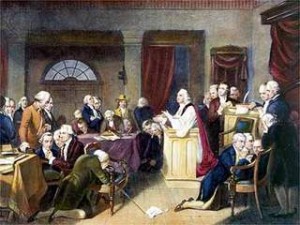 on, the more people think that they understand their rights, when they really don’t, and so they end up giving their rights away. Our Constitution and the Bill Of Rights, and indeed, all the amendments to the Constitution, are so important to each and every one of us, and we need to know what is there, so that when some branch of the government steps on those rights, and someone speaks out about it, we don’t find ourselves on the wrong side of the issue. It really isn’t about whether or not we agree with the issue, but whether or not it is legal, because if the government will take away one right illegally, they will also take away another right illegally, and someday, they will get to one that affects you…but by then, it may be too late to stop an already runaway government.
on, the more people think that they understand their rights, when they really don’t, and so they end up giving their rights away. Our Constitution and the Bill Of Rights, and indeed, all the amendments to the Constitution, are so important to each and every one of us, and we need to know what is there, so that when some branch of the government steps on those rights, and someone speaks out about it, we don’t find ourselves on the wrong side of the issue. It really isn’t about whether or not we agree with the issue, but whether or not it is legal, because if the government will take away one right illegally, they will also take away another right illegally, and someday, they will get to one that affects you…but by then, it may be too late to stop an already runaway government.
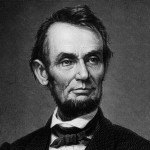 On June 16, 1858 more than 1,000 delegates met in the Springfield, Illinois, statehouse for the Republican State Convention. They chose Abraham Lincoln as their candidate for the U.S. Senate, running against Democrat Stephen A. Douglas. At 8:00 pm Lincoln delivered his famous House Divided speech to his Republican colleagues in the Hall of Representatives. Lincoln said, “A house divided against itself cannot stand. I believe this government cannot endure, permanently, half slave and half free. I do not expect the Union to be dissolved — I do not expect the house to fall — but I do expect it will cease to be divided. It will become all one thing or all the other. Either the opponents of slavery will arrest the further spread of it, and place it where the public mind shall rest in the belief that it is in the course of ultimate extinction; or its advocates will push it forward, till it shall become lawful in all the States, old as well as new — North as well as South.” Abraham Lincoln decided to run for president, and was elected president on November 6, 1860, and on December 20, 1860 it began…South Carolina seceded from the Union, followed within two months by Mississippi, Florida, Alabama, Georgia, Louisiana, and Texas. On February 9, 1861 the Confederate States of America was formed with Jefferson Davis as it’s president. Abraham Lincoln was sworn in as the 16th President of the United States of America on March 4, 1861. On April 12, 1861 the Confederates under General Pierre Beauregard attacked Fort Sumter in Charleston, South Carolina…the Civil War had begun.
On June 16, 1858 more than 1,000 delegates met in the Springfield, Illinois, statehouse for the Republican State Convention. They chose Abraham Lincoln as their candidate for the U.S. Senate, running against Democrat Stephen A. Douglas. At 8:00 pm Lincoln delivered his famous House Divided speech to his Republican colleagues in the Hall of Representatives. Lincoln said, “A house divided against itself cannot stand. I believe this government cannot endure, permanently, half slave and half free. I do not expect the Union to be dissolved — I do not expect the house to fall — but I do expect it will cease to be divided. It will become all one thing or all the other. Either the opponents of slavery will arrest the further spread of it, and place it where the public mind shall rest in the belief that it is in the course of ultimate extinction; or its advocates will push it forward, till it shall become lawful in all the States, old as well as new — North as well as South.” Abraham Lincoln decided to run for president, and was elected president on November 6, 1860, and on December 20, 1860 it began…South Carolina seceded from the Union, followed within two months by Mississippi, Florida, Alabama, Georgia, Louisiana, and Texas. On February 9, 1861 the Confederate States of America was formed with Jefferson Davis as it’s president. Abraham Lincoln was sworn in as the 16th President of the United States of America on March 4, 1861. On April 12, 1861 the Confederates under General Pierre Beauregard attacked Fort Sumter in Charleston, South Carolina…the Civil War had begun.
The war was long and bloody. Families were torn apart, as brothers fought against brothers and fathers against sons. The South wanted slavery, and the North did not. This war would be a horrible, brutal war. Losing was not an option for the North. Slavery had to be abolished…it was inhumane, and wrong in every sense of the word. This was Lincoln’s signature change to this nation, and those who didn’t want it hated him for it. The battles raged for four long years, ending the lives of 618,222 Americans and eventually sending 50,000 survivors home as amputees. The Civil War would go down in history as the deadliest of all United States wars…and the enemy wasn’t a terrorist group or some other country…it was us. I think it is a sad thing to think that we were our own worst enemy at one time in history.
The battles of the Civil War are names many people remember from their history lessons, Chickamauga, Chattanooga, Cold Harbor, Chancellorsville, Fredericksburg, Bull Run, and a second Bull Run, Shiloh, Antietam..which was the bloodiest day in US Military history with 26,000 men killed, and of course the famous Battle of Gettysburg on July 1-3, 1863, which was the battle that turned the tide in favor of the Union. On November 19, 1863, President Lincoln gave his famous Gettysburg address dedicating the Soldiers’ National Cemetery. The war continued for another year and a half, before General Robert E Lee, being completely surrounded by Union forces, with no possibility of escape, surrendered to General Ulysses S Grant at Appomattox, Virginia. They agreed to a meeting in the parlor of the Wilmer McLean home. The meeting took place at one o’clock in the afternoon, and on this day, April 9, 1865 General Robert E Lee surrendered.
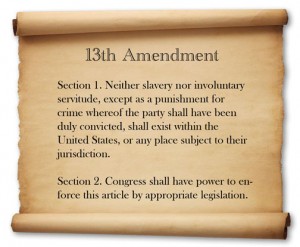 The Union had all but won, but this was not over yet. On April 14, 1865, the Stars and Stripes was raised over Fort Sumter…where the war began. That night President Lincoln and his wife, Mary, went to see the play “Our American Cousin” at the Ford Theater. At 10:13pm, during the third act of the play, Confederate sympathizer John Wilkes Booth shot the president in the head. He was moved to the house across the street where doctors tried in vain to save his life. President Lincoln died at 7:22am on April 15, 1865. The war dwindled to a close, and in May the final soldiers surrendered. The Union was restored, and the Thirteenth Amendment to the United States Constitution was passed by Congress on January 31, 1865, and was finally ratified on December 6, 1865.
The Union had all but won, but this was not over yet. On April 14, 1865, the Stars and Stripes was raised over Fort Sumter…where the war began. That night President Lincoln and his wife, Mary, went to see the play “Our American Cousin” at the Ford Theater. At 10:13pm, during the third act of the play, Confederate sympathizer John Wilkes Booth shot the president in the head. He was moved to the house across the street where doctors tried in vain to save his life. President Lincoln died at 7:22am on April 15, 1865. The war dwindled to a close, and in May the final soldiers surrendered. The Union was restored, and the Thirteenth Amendment to the United States Constitution was passed by Congress on January 31, 1865, and was finally ratified on December 6, 1865.
 I have not seen my cousin Shirley for about 30 years, but recently we have reconnected due to my mother’s desire to give Shirley our grandma’s wedding gown. Shirley is the oldest granddaughter of my dad’s and her mom’s mother, and as such, the wedding gown should go to her. It had been left in my dad’s care. After Dad passed away, Mom decided to give the dress to Shirley, but we had no way to get a hold of her. God takes care of the things we aren’t able to, and almost immediately, Shirley’s son, Larry showed up in a family tree search I was doing in Ancestry.com. He was searching too, and we connected. He got me in touch with Shirley, and then we and several other family members connected on Facebook. It is amazing how one little step can change the lives of so many people.
I have not seen my cousin Shirley for about 30 years, but recently we have reconnected due to my mother’s desire to give Shirley our grandma’s wedding gown. Shirley is the oldest granddaughter of my dad’s and her mom’s mother, and as such, the wedding gown should go to her. It had been left in my dad’s care. After Dad passed away, Mom decided to give the dress to Shirley, but we had no way to get a hold of her. God takes care of the things we aren’t able to, and almost immediately, Shirley’s son, Larry showed up in a family tree search I was doing in Ancestry.com. He was searching too, and we connected. He got me in touch with Shirley, and then we and several other family members connected on Facebook. It is amazing how one little step can change the lives of so many people.
Since reconnecting with Shirley I have learned several things about her. Shirley is a patriotic American, who believes in the Constitution and the freedoms and rights it gives to each of us. She believes in hard work and being able to keep what you earn. She believes in the right to keep and bear arms. As I said, the Constitution and all its rights and freedoms. She and I are very much alike that way. It makes me proud that my cousin and I share our conservative American beliefs.
I also know that Shirley loves living up in the mountains, away from the crowds in town. That is not so unusual in that her family lived outside Casper on a piece of land in the Dempsey Acres area when she was a little girl growing up. I guess you could say that  country living was in her blood. After leaving Casper, and trying some big cities, the family would move to the mountains of Washington. Shirley is a hard working woman who likes the simple things like the birds and other mountain sounds of the summer morning.
country living was in her blood. After leaving Casper, and trying some big cities, the family would move to the mountains of Washington. Shirley is a hard working woman who likes the simple things like the birds and other mountain sounds of the summer morning.
Today is Shirley’s birthday. We are sending you birthday wishes across the miles. We are thankful that our families have reunited again, though we have not yet seen each other in person yet. We hope your day is filled with all of God’s greatest blessings. Happy birthday dear cousin!! We love you!!

